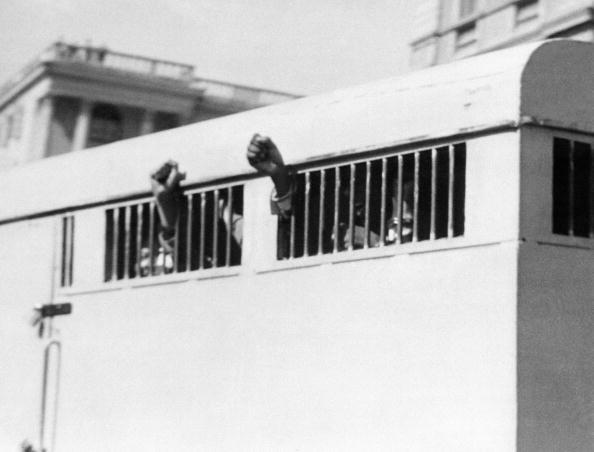“What counts in life is not the mere fact that we have lived. It is what difference we have made to the lives of others that will determine the significance of the life we lead.”
The obituaries for the great man are multitude, so I’m not about to recycle them. Just a brief, inadequate reflection on what Madiba’s life taught me.
Nelson Mandela was released from prison in 1990, when I was in grade 10. His plight and struggle, and the struggle of South Africa, had a formative influence on my thinking as a young man.
Even though his fight was half a world and a different culture away, the example of his life was instrumental in helping me understand the nature of power, of struggle and injustice. Such was Mandela’s charisma and humanity that this message cut through, all the way to a modest suburb in Australia in the late 1980s.
I can only imagine the pride and courage he gave to generations of South Africans, to kids in the developed world, to the marginalised yearning for justice.
One of the things that stood out about Mandela was this: he was a fighter.
Yes, he was a peacemaker as well, one of the great peacemakers of history. His moral example, leadership, and extraordinary capacity for forgiveness single-handedly saved South Africa from descending into civil war.
But Mandela also showed that if you want to do something about injustice in the world, you have to be willing to fight for it. His life embodied a refusal to sit on the sidelines and hope others would find solutions.
Desmond Tutu said of the South African struggle, “If you are neutral in situations of injustice, you have chosen the side of the oppressor.”
So he struggled, at first peacefully, but when the repression of the South African government brooked no alternative, he turned to violence.
As Mandela noted about one of history’s other great warriors for justice: “Gandhi himself never ruled out violence absolutely and unreservedly. He conceded the necessity of arms in certain situations. He said, ‘Where choice is set between cowardice and violence, I would advise violence… I prefer to use arms in defense of honor rather than remain the vile witness of dishonor …’”
Because of this, because significant support for the ANC’s struggle came from communist states, and because of good old-fashioned racism, many western nations turned their back on Mandela.
We shouldn’t forget that the ANC was placed on an official list of ‘terrorist’ groups by UK and the US – then under the respective leaderships of the odious reactionary Thatcher and the senile Hollywood gunslinger, Ronald Reagan.
There were, however, exceptions. Australia was one.
Prime Minister Bob Hawke and the Australian union movement were long-standing opponents of apartheid. Indeed, Hawke expended considerable energy in having sanctions against South Africa strengthened, including though pressure on global banks that were supporting the South African economy.
During a visit to Australia in 1990 (the first country outside of Africa he visited after his release),  Mandela told Bob Hawke that Australia’s activism helped to bring an end to the apartheid regime.
Mandela told Bob Hawke that Australia’s activism helped to bring an end to the apartheid regime.
Fortunately for the rest of us, we don’t have to resort to violent struggle or monumental self-sacrifice. Most of us have the luxury of fighting for causes we believe in while experiencing limited personal repercussions.
Which makes widespread apathy about the great moral issues of our time all the more shameful.
I’ve worked for about ten years as an aid worker and, before that, about a year as a refugee advocate. Nelson Mandela was one of the reasons I chose this path. He taught me I had an ethical responsibility to take sides, to fight the good fight.
There’s no apartheid in South Africa anymore, but there are other issues just as morally toxic.
The environment continues to head towards oblivion, abetted by an apathetic public and by vested interests who seek to downplay the importance of climate change. Or worse, engage in vilification campaigns the scientists who provide the evidence.
We live in a world that operates under an economic system that is fundamentally unjust. As Mandela said, “…the fallacy of the claim that everyone can be rich and successful provided they work hard. [Ignores] the millions who work themselves to the bone and still remain hungry.”
A tiny global elite – the 1 per cent – are steadily accumulating power and wealth, while every country in the world becomes more and more unequal. Public services are breaking down, the number of working poor growing, and the disillusionment with democratic institutions at an all-time high.
The UN estimates more than four million individuals are trafficked every year, with a disproportionate number of those women and children in the sex trade.
Girls in Afghanistan and parts of Pakistan are shot for wanting to attend primary school and schools that open their doors to girls are routinely burned to the ground.
Over a billion still go hungry every day, and hundreds of millions of children in developing countries will never see the inside of a classroom.
Apartheid in South Africa is gone. But there are a hundred other fights, each wanting our attention just as desperately.
Mandela’s lesson is this: you can’t remain on the sidelines.
